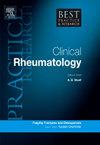干扰素病:从概念到临床实践。
IF 4.8
2区 医学
Q1 RHEUMATOLOGY
Best Practice & Research in Clinical Rheumatology
Pub Date : 2024-09-01
DOI:10.1016/j.berh.2024.101975
引用次数: 0
摘要
由 I 型干扰素分泌异常引起的自身炎症性恐怖症决定了一类特殊的自身炎症性疾病--干扰素病。涉及核酸感应、代谢或缺乏干扰素信号逆向控制的各种机制是艾卡迪-古铁雷斯综合征(AGS)、蛋白酶体相关自身炎症性疾病(PRAAS)、STING-婴儿期发病相关血管病(SAVI)和某些形式的单基因系统性红斑狼疮(SLE)相关表型的原因。本综述从基本的免疫遗传学概念到诊断和治疗,探讨了干扰素病。本文章由计算机程序翻译,如有差异,请以英文原文为准。
Interferonopathies: From concept to clinical practice
The horror autoinflammaticus derived from aberrant type I interferon secretion determines a special group of autoinflammatory diseases named interferonopathies. Diverse mechanisms involved in nucleic acids sensing, metabolizing or the lack of interferon signaling retro-control are responsible for the phenotypes associated to Aicardi-Goutières Syndrome (AGS), Proteasome-Associated Autoinflammatory Diseases (PRAAS), STING-Associated Vasculopathy with Infancy Onset (SAVI) and certain forms of monogenic Systemic lupus erythematosus (SLE). This review approaches interferonopathies from the basic immunogenetic concept to diagnosis and treatment.
求助全文
通过发布文献求助,成功后即可免费获取论文全文。
去求助
来源期刊
CiteScore
9.40
自引率
0.00%
发文量
43
审稿时长
27 days
期刊介绍:
Evidence-based updates of best clinical practice across the spectrum of musculoskeletal conditions.
Best Practice & Research: Clinical Rheumatology keeps the clinician or trainee informed of the latest developments and current recommended practice in the rapidly advancing fields of musculoskeletal conditions and science.
The series provides a continuous update of current clinical practice. It is a topical serial publication that covers the spectrum of musculoskeletal conditions in a 4-year cycle. Each topic-based issue contains around 200 pages of practical, evidence-based review articles, which integrate the results from the latest original research with current clinical practice and thinking to provide a continuous update.
Each issue follows a problem-orientated approach that focuses on the key questions to be addressed, clearly defining what is known and not known. The review articles seek to address the clinical issues of diagnosis, treatment and patient management. Management is described in practical terms so that it can be applied to the individual patient. The serial is aimed at the physician in both practice and training.

 求助内容:
求助内容: 应助结果提醒方式:
应助结果提醒方式:


